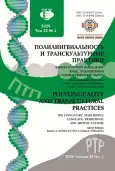Morphological Homonyms in the Modern Mari Language
- Авторлар: Lastochkina E.G.1
-
Мекемелер:
- Mari State University
- Шығарылым: Том 22, № 1 (2025): THE FINNO-UGRIC MARI PEOPLE: LANGUAGE, TRADITIONAL AND ARTISTIC CULTURE
- Беттер: 26-38
- Бөлім: Language in System
- URL: https://journal-vniispk.ru/2618-897X/article/view/326867
- DOI: https://doi.org/10.22363/2618-897X-2025-22-1-26-38
- EDN: https://elibrary.ru/DWAWWN
- ID: 326867
Дәйексөз келтіру
Толық мәтін
Аннотация
The subject of the study is grammatical homonyms in the modern Mari language. The scientific work was based on examples from the Mari Language Dictionary, the Mari-Russian dictionary, as well as data from a card file compiled by the author based on folklore, fiction, and periodical materials. Homonyms are found at almost all levels of the language: in phonetics (homo-phones), word formation, morphology. These can be not only words, but also word forms (suffixes and inflections), as well as phrases that sometimes belong to different grammatical categories. In the modern Mari language, homonyms can be divided into four groups: lexical homonyms, homoforms, homophones, homographs. The purpose of the work is to define morphological homonyms, to identify this group of homonyms, their features and number in the Mari language. The research method was the analysis of homonymous words based on lexicographic sources, as well as the method of analyzing scientific literature and the linguistic (descriptive) method. The result of the study was the conclusion that homoforms have become widespread in the modern Mari language. The homoform is not a permanent form, but a temporary one that exists until the next transformation. When they change, they already begin to differ from each other both in sound and form. Homoforms in the Mari language can be divided into the following groups: grammatical, lexical and grammatical.
Негізгі сөздер
Авторлар туралы
Elena Lastochkina
Mari State University
Хат алмасуға жауапты Автор.
Email: antrolea@mail.ru
ORCID iD: 0000-0001-7081-1982
SPIN-код: 2655-5093
Doctor of Philosophy (PhD), Candidate of Philology, Associate Professor, Department of Mari Language and Literature
1 Lenin Sq, Yoshkar-Ola, 424000, Republic of Mari El, Russian FederationӘдебиет тізімі
- Avdina, A. I. 2022. “Classification of homonyms (based on homonym dictionaries).” Bulletin of the South Ural State Humanitarian Pedagogical University, vol. 19, no. 2, pp. 52–58. https://doi.org/10.14529/ling220207 EDN: ILKLBQ Print. (In Russ.)
- Kuzmina, R.V. 2010. “Grammatical homonyms: phonetic and graphical means of distinguishing them”. News of Higher Educational Institutions. The Series “Humanities”, vol. 1, no. 1, pp. 52–57. EDN: NEIIDN Print. (In Russ.)
- Lastochkina, E.G. 2023. “Lexical homonyms in the Mari language.” Litera, no. 11, pp. 55–61, 9 Sept 2024, https://e-notabene.ru/fil/article_68994.html https://doi.org/10.25136/2409-8698. 2023.11.68994 EDN: FBRQIS (In Russ.)
- Lastochkina, E.G. 2021. Homonyms in the modern Mari language. Yoshkar-Ola: Mari State University. Print. (In Russ.)
- Lastochkina, E.G. 2022. “The issue of distinguishing between homonymy and polysemy in the modern Mari language.” Bulletin of the Mari State University, vol. 16, no. 4, pp. 569–574. https://doi.org/10.30914/2072-6783-2022-16-4-569-574 EDN: OZOCNO Print. (In Russ.)
- Vinogradov, V.V. 1960. “About homonymy and related phenomena”. Questions of linguistics, no. 5, pp. 3–17. Print. (In Russ.)
- Vinogradov, V.V. 1953. “The main types of lexical meanings of a word”. Questions of Linguistics, no 5, pp. 3–29. Print. (In Russ.)
- Rosenthal, D.E., Golub, I.B., and M.A. Telenkova. 2002. Modern Russian language. Lexical homonymy. 4th ed. Moscow: Iris-press. Print. (In Russ.)
- Shmelev, D.N. 1977. Modern Russian language. Vocabulary. Moscow: Unified URSS. Print. (In Russ.).
- Rosenthal, D.E., and M.A. Telenkova. 1976. Dictionary and reference book of linguistic terms. Moscow: Education. Print. (In Russ.)
- Avdina, A.I. 2013. “Grammatical homonymy as a specific phenomenon of language”. Bulletin of the South Ural State Humanitarian Pedagogical University, no. 9, pp. 204–211. EDN: RRWMQZ Print. (In Russ.)
- Ramazanova, P. M. 2002. Homonyms in the modern Avar language (Dissertation for the degree of Candidate of Sciences). Makhachkala, 1 Oct 2024, https://www.dissercat.com/content/omonimy-v-sovremennom-avarskom-yazyke EDN: QDPBNL (In Russ.)
Қосымша файлдар









